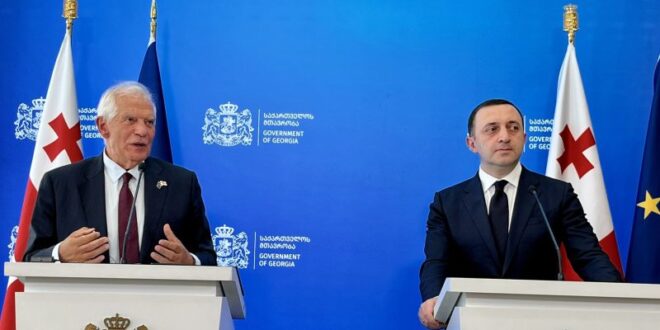Georgia’s failure to integrate into the EU would play into Russia’s hands, the EU’s chief diplomat Josep Borrell warned on Friday (8 September), urging Tbilisi to refrain from ‘counterproductive’ polarisation.
Speaking in Tbilisi alongside Georgia’s Prime Minister Irakli Garibashvili, Borrell said there is no doubt that the country “belongs to the European family”, but stressed Tbilisi has so far only fulfilled three out of 12 priorities the bloc has put forward as a precondition before granting candidacy status to the country.
“Russia will be very happy if we don’t succeed” in integrating Georgia into the EU, Borrell told reporters in Tbilisi, adding that “the EU will not abandon Georgia”.
A day earlier, upon arrival in Tbilisi, he warned that Brussels will need to see more signs of progress on key reforms if it is to give the green light to the country’s next steps as part of EU’s enlargement update expected in mid-October.
With concerns mounting in the West over Georgia’s backsliding on commitments to democracy and its Euro-Atlantic orientation, amid the political crisis that gripped the country in recent years, the European Commission’s oral assessment in May had been less positive for Georgia than for the other two Eastern EU hopefuls, Ukraine and Moldova.
The EU’s executive then stressed Tbilisi still needed to make progress on judicial reforms, in particular of the Supreme Court, step up the fight against corruption and powerful oligarchs, and sort out public finances.
Garibashvili in turn insisted that his government was “fully on the same page with the EU when it comes to Russia’s invasion of Ukraine, democracy, human rights.”
“The only correct political decision would be to grant Georgia EU candidacy by the end of the year,” Garibashvili said, adding that if the EU fails to embrace Georgia, it “will send a wrong message to Russia”.
Borrell’s visit to the country comes at a highly sensitive moment as observers have pointed to the rising Russian influence on the country.
The EU’s chief diplomat criticised Georgia’s recent decision to resume direct flights with Russia.Brussels condemned the move and urged Tbilisi to align with the EU’s Russia policy or risk seriously damaging its ties with the EU.
Earlier in March, Georgia was rocked by protests after the government introduced a Russian-style ‘foreign agents’ law.
‘Counterproductive’ polarisation
Out of the 12 recommendations made by the European Commission in June 2022, the first – ‘political depolarisation’ – has proven to be the most challenging one for Georgia.
The EU visit was overshadowed by the impeachment procedures announced this week by the ruling Georgian Dream party against the country’s president, Salome Zourabichvili, for what the government called ‘unauthorised’ foreign visits.
Zourabishvili recently concluded a series of European visits – to Berlin, Brussels, and Paris -to promote Georgia’s EU candidacy.
According to the Georgian constitution, the president – whose post is largely symbolic — requires permission from the government before conducting any foreign policy activities, which in Zourabishvili’s case had been refused but she went ahead anyway.
Addressing the issue, Borrell said the situation “risks further increasing the counterproductive polarisation”.
“All institutions of the country have to work together, providing together strong support to the European path,” Borrell said, adding the integration process was a “joint effort” and the government and the ruling party carried the “main responsibility” to create possibilities for cooperation.
On Friday, Borrell was also due to meet with Zourabishvili, civil society organisations as well as opposition representatives.
 Eurasia Press & News
Eurasia Press & News



